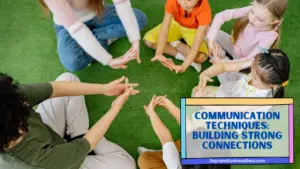Daycare teachers play a unique and crucial role in the lives of young children, molding their early experiences and laying the groundwork for their future development. To flourish in this capacity, daycare instructors must have a diversified skill set that goes beyond basic supervision. The path to becoming a competent and inspiring daycare teacher entails taking a series of comprehensive courses covering a wide range of topics.
The most useful training for daycare teachers includes child development, safety, curriculum planning, communication, and behavior management. It also includes first aid and early childhood education techniques to ensure effective and nurturing care for young children.
In this article, we dig into the realm of daycare teacher training, focusing light on the crucial courses that enable educators to create supportive and enriching settings for the children they care for. As we examine these courses, we will discover how each component contributes to the holistic development of both teachers and their students.
Child Development: The Foundation of Effective Daycare Teaching

Understanding child growth is the foundation of effective daycare instruction. Childcare educators must understand the numerous stages of physical, cognitive, social, and emotional maturity that children go through. This cognitive toolkit of information enables teachers to tailor their engagements, exercises, and educational junctures to the unique developmental needs of each kid in their care. Daycare teachers adeptly build an environment that innately encourages not only optimum growth but also effective learning through adept recognition and adept handling of critical developmental milestones.
Child development, as a complicated mosaic of changing aspects, demands a nuanced understanding. Daycare teachers are responsible for accommodating this varied journey, from the fundamentals of gross and fine motor abilities to the advanced realms of abstract reasoning. They operate as learning orchestrators, tailoring their curricular and interactional tapestry to each child’s emerging mental model. This unique approach, founded on developmental discoveries, fosters a learning environment in which children are encouraged to thrive, explore, and construct understanding.
Daycare educators adjust their techniques based on each kid’s developmental trajectory since they have a comprehensive understanding of child development. They plant the seeds of social camaraderie while respecting the introverted bud; they encourage cognitive curiosity while keeping the learning rate in mind; and they cultivate emotional intelligence while respecting different temperaments. This careful approach cultivates an atmosphere of inclusivity, empowerment, and individual progress.
Daycare teachers emerge as potential sculptors when they combine developmental sensitivity with pedagogical competence. They possess not only academic knowledge but also a great understanding of how children develop holistically. As a result, the daycare environment evolves from simply custodial care to an arena of transformative effect. A tapestry in which each thread reflects a child’s path and each interaction weaves the story of growth.
Read more about: Childcare Prowess Unlocked: Essential Lessons in Free Training
Safety Protocols: Safeguarding Every Child’s Well-Being
In any daycare setting, elevating children’s safety to a priority is an unbreakable premise. Proper training plays a critical role in arming childcare teachers with a varied arsenal that allows them to create an all-encompassing fortress of safety. These educators are not only armed with the necessary abilities but they are also instilled with heightened attention to proactively anticipate any hazards as a result of extensive training.
The training program designed for childcare teachers is a critical strand in the fabric of security. By giving these educators the ability to detect hidden dangers, they gain the ability to eliminate or reduce risks before they occur. This proactive attitude permeates the daycare environment, transforming it into a safe refuge immune to the whims of chance.
Emergency preparedness is a cornerstone of this training, allowing daycare workers to face unexpected catastrophes with confidence. This program equips instructors to manage the stormy waters of emergencies while keeping a steady hand on the rudder, including fire drills that simplify the staged escape of students and processes equipped for managing different eventualities. Another aspect of this training is childproofing, which is the construction of a layer of defense against potential hazards, ensuring that every nook and cranny is an enclave of protection for the youngsters under their supervision.
This prepared symphony culminates in creating everlasting confidence in parents and guardians. Entrusting their most prized possessions to the care of a daycare center, they take comfort in the thought that their children are cocooned in a cocoon of security. The visual manifestation of training’s impact is seen in the demeanor of educators who demonstrate not only skill but also an intrinsic devotion to the well-being of every kid.
Curriculum Planning: Fostering Age-Appropriate Learning
Making an effective daycare curriculum serves as a bridge connecting young minds to a world of exploration and learning, developing their intrinsic curiosity into a flowering adventure of discovery. The importance of curriculum planning training becomes a beacon in this critical undertaking, illuminating the route for childcare teachers to weave a tapestry of experiences that flawlessly integrate engagement and instruction.
Curriculum planning training, at its core, provides childcare workers with the artistry of adapting activities to their charges’ developmental phases. The symphony of age-appropriate activities strikes a harmonious chord with the developing cognitive capacities of children, striking a balance between difficulty and achievability. This personalized approach stokes the fires of curiosity, enticing young minds to travel into the realms of discovery.
This instruction is analogous to a color palette, allowing educators to incorporate creativity and problem-solving into the fabric of everyday operations. Each action becomes a microcosm of cognitive development, encouraging not just the acquisition of knowledge but also the development of critical thinking skills. Daycare teachers ignite children’s interest through carefully choreographed exercises, causing a domino effect that encourages them to seek, question, and develop understanding.
The incorporation of play-based learning, sensory experiences, and exploratory activities is the curriculum’s cornerstone. These aspects are more than just tools; they are catalysts for overall development. Play becomes a learning medium, sensory experiences open doors to comprehending the world, and travel becomes a pilgrimage of discovery. Children discover joy in learning amid these carefully organized meetings, a joy that becomes an everlasting companion on their educational journey.
Daycare teachers leave an indelible mark on their charges by instilling a love of learning in them at a young age. The foundation established during these formative years reverberates into the future, forming a platform for academic growth. The symphony of play and learning, directed by skilled educators, makes an indelible imprint on youngsters, molding them into eager and capable learners.
Communication Techniques: Building Strong Connections

Clear and efficient communication emerges as the essential note that orchestrates harmony in the delicate dance of creating meaningful relationships within a daycare setting. This beautiful melody resonates not only between daycare staff and the children under their care but also between parents. Communication has a significant impact on understanding, cooperation, and trust, and this profound impact is nurtured through skilled training in communication skills.
Daycare teachers have an important role in connecting the worlds of children and their parents. To bridge this gap, they must communicate information about a child’s journey, progress, and needs, in a way that goes beyond words. This style of communication must be a seamless tapestry of simplicity and depth to stimulate open discourse. The master key that unlocks the rich patterns of this tapestry is communication skill training.
The growth of active listening skills emerges as an art that childcare teachers acquire inside this program. Beyond hearing words, active listening entails comprehending the subtleties of a child’s expressions as well as the unsaid messages of worried parents. This sympathetic involvement lays the way for empathy, forging bonds that go beyond the surface layers of dialogue.
Another gem fostered inside this program is empathy, which functions as a lubricant to smooth the gears of communication. The ability to put oneself in the shoes of another goes beyond the transactional, becoming a bridge that spans the divide between people. Empathy is the base upon which trust is established, and it is the foundation upon which the rich superstructure of positive relationships is built.
The third feature of this training’s pearl is adaptability in communication style. Daycare teachers must communicate with children, parents, and colleagues while wearing numerous hats. The ability to adapt one’s communication style to appeal to a wide range of people enhances collaboration and creates the path for harmonious interactions.
Communication technique instruction serves as a conductor’s baton, assisting educators in composing peaceful connections. Daycare teachers create a story of trust and collaboration via active listening, empathy, and adaptability. The ripple effect of their skilled communication reaches children’s hearts and resonates in parents’ receptive ears, echoing the spirit of a compassionate and supporting daycare setting.
Read more about: Childcare Prowess Unlocked: Essential Lessons in Free Training
Behavior Management: Nurturing Positive Social Skills
Children enter a tapestry of new social experiences within the changing geography of daycare settings. The skill of behavior control takes center stage here, a key role that daycare teachers play expertly. This function covers the development of important life skills that scaffold a child’s social navigation, in addition to the plain orchestration of order. Behavior management training serves as a compass for these educators, directing them toward tactics that build positive social aptitude, conflict resolution skills, and the critical art of self-regulation.
Behavior management is more than just a command to obey; it’s a road map that guides a youngster through the complexities of social relations. The training provides childcare teachers with a toolkit of tactics that combine coaching and mentoring. These tactics help youngsters develop positive social skills, converting their interactions into a symphony of respect, cooperation, and kindness.
Conflict resolution is a critical milestone in the field of behavior management. The program equips childcare teachers with the knowledge and skills to foster the art of constructively addressing disagreements and obstacles. Children learn to sail the stormy waters of a dispute with elegance by channeling disagreements toward resolution, learning lessons that will be useful throughout their lives.
However, the formation of internal mastery is at the heart of behavior control, not only external instruction. The training enables childcare workers to instill self-regulation in children. This internal compass, developed via an awareness of emotions and their effects, enables youngsters to manage their answers with poise rather than succumbing to impulsive impulses.
The building of a supportive environment is at the heart of good behavior management. Daycare teachers act as designers of this environment, creating settings where empathy and understanding reign supreme. These educators give students the psychological safety net they need to explore their emotions, express themselves, and welcome differences without fear. As a result, this loving environment serves as a testing ground for each child’s emotional and social development.
Integrating First Aid and Early Childhood Education Techniques
Daycare teaching goes beyond its essential components, embracing a domain in which the combination of first aid training and early childhood education methodologies forges a teacher’s capabilities into well-rounded knowledge. This combination of abilities takes instructors into a realm where not only knowledge but also preparation, creativity, and overall growth intersect.
Within daycare settings, first aid training develops as a sentinel of safety. The training armors instructors in readiness, allowing them to meet medical emergencies head-on. The unexpected can happen quickly in the vibrant chaos of a childcare environment, where laughter and movement reign supreme. First aid training acts as a lighthouse, ensuring that teachers are well-equipped to traverse turbulent waters. This preparedness to respond quickly can make a significant difference, perhaps ensuring the safety and well-being of the children entrusted to their care.
Early childhood education strategies weave a tapestry of enriched learning experiences in unison with this readiness. This tapestry is made up of a variety of approaches that straddle the boundary between education and fun. Teachers use play-based learning to turn education into an adventure, turning information into a treasure to be sought rather than a chore to be endured. Hands-on activities promote experiential learning in which youngsters interact with the world, kindling both curiosity and comprehension.
The storytelling art brings lessons to life, taking children into the regions of their imaginations while encouraging language development. Children learn to collaborate, communicate, and respect each other’s views through interactive group activities, which foster the development of fundamental social skills.
Together, these early childhood education strategies establish an atmosphere in which learning is not limited to textbooks but pervades every aspect of life. The pleasurable aspect of these strategies fosters a natural curiosity in youngsters that extends beyond the classroom.
Frequently Asked Questions

How important is child development training for daycare teachers?
Child development training provides daycare workers with a thorough understanding of the various phases of physical, cognitive, social, and emotional development that children go through. This understanding allows teachers to adjust their interactions and activities to each child’s developmental needs, promoting optimal learning and growth.
What are the benefits of behavior management training for daycare teachers and children?
Behavior management training provides ways for daycare teachers to support children in developing positive social skills, conflict resolution, and self-regulation. Teachers help children’s emotional and social development, as well as their overall well-being, by fostering a supportive environment that develops empathy and understanding.
Why is including first aid training for daycare teachers important?
Childcare teachers must have first aid training to respond effectively to medical situations that may occur in the childcare setting. Basic first aid skills can make a significant difference in safeguarding the safety and well-being of youngsters. It gives parents and guardians confidence that their children are in capable hands in the event of an emergency.
To learn more on how to start your own daycare checkout my startup documents here.
The information provided by DaycareBusinessBoss.com (“The Site”) is for general informational purposes only. All information on the Site is provided in good faith, however, we make no representation or warranty of any kind, express or implied, regarding the accuracy, adequacy, validity, reliability, availability or completeness of any information on the Site. Under no circumstance shall we have any liability to you for any loss or damage of any kind incurred as a result of the use of the Site or Reliance on any information provided on the Site. Your use of the Site and your reliance on any information on the Site is solely at your own risk.
This blog post is for educational purposes only and does not constitute legal advice. Please consult a legal expert to address your specific needs. Terms and Conditions. (https://daycarebusinessboss.com/terms-conditions/)

Meet Shawn Chun: Entrepreneur and Childcare Business Fan.
I’m a happy individual who happens to be an entrepreneur. I have owned several types of businesses in my life from a coffee shop to an import and export business to an online review business plus a few more and now I create online daycare business resources for those interested in starting new ventures. It’s demanding work but I love it. I do it for those passionate about their business and their goals. That’s why when I meet a childcare business owner, I see myself. I know how hard the struggle is to retain clients, find good employees and keep the business growing all while trying to stay competitive.
That’s why I created Daycare Business Boss: I want to help childcare business owners like you build a thriving business that brings you endless joy and supports your ideal lifestyle.


